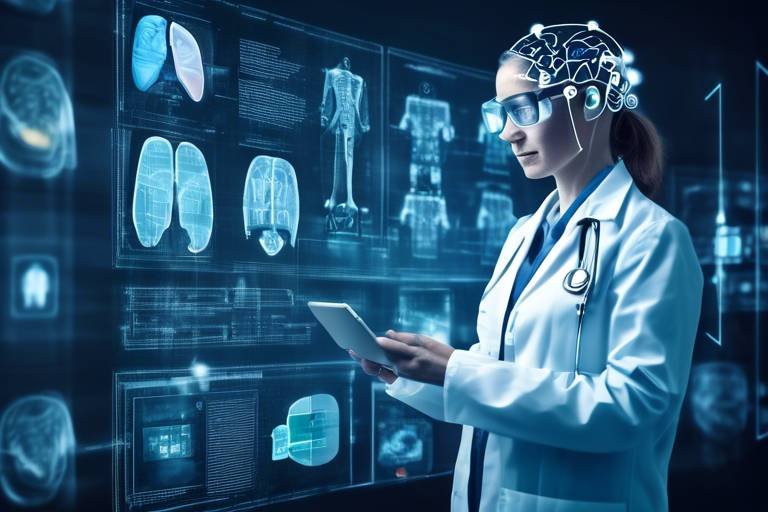The Role of AI in Improving Healthcare Delivery
Artificial Intelligence (AI) is not just a buzzword; it's a game changer in the healthcare industry. Imagine a world where your doctor knows exactly what treatment you need even before you step into the clinic. Sounds like science fiction, right? Well, it’s becoming a reality as AI technologies are rapidly transforming healthcare delivery. From enhancing patient outcomes to streamlining processes and revolutionizing diagnostics, AI is paving the way for a more efficient and effective healthcare system.
One of the most significant impacts of AI is its ability to enhance patient care. With the help of personalized treatment plans, predictive analytics, and real-time monitoring, healthcare providers can offer tailored services that cater to individual needs. This not only leads to better health outcomes but also ensures that patients receive timely interventions. Picture this: a system that can analyze your health data in real-time, predicting potential health issues before they escalate. That’s the power of AI!
AI technologies are improving patient care through a variety of innovative methods. For instance, predictive analytics can analyze trends in patient data, helping healthcare providers anticipate complications and act proactively. This means fewer hospital visits and a more streamlined patient experience. Additionally, AI can facilitate real-time monitoring of patients, allowing for immediate responses to changes in health status. Imagine being able to monitor your heart rate or blood sugar levels from the comfort of your home, with alerts sent directly to your healthcare provider if something goes awry. This level of responsiveness can significantly enhance overall patient care.
Beyond patient care, AI is also making waves in the administrative side of healthcare. Think about the mountains of paperwork that healthcare professionals wade through daily. AI can automate routine tasks such as scheduling, billing, and patient management, which not only reduces the burden on healthcare staff but also minimizes errors. This means more time for healthcare professionals to focus on what they do best—caring for patients.
One of the most frustrating experiences for patients is waiting for their appointments. AI can optimize appointment scheduling and patient flow, significantly reducing wait times in healthcare facilities. By analyzing patterns in patient arrivals and treatment durations, AI can create schedules that maximize efficiency. This not only enhances patient satisfaction but also improves overall service delivery.
Imagine having a virtual assistant that’s available 24/7 to answer your questions. AI-powered chatbots can provide immediate responses to patient inquiries, assist in appointment bookings, and even offer preliminary medical advice. This functionality reduces administrative burdens and ensures that patients have access to information whenever they need it. It’s like having a friendly guide in the often overwhelming world of healthcare.
Data management is another area where AI shines. AI-driven data management systems can efficiently organize and analyze patient records, ensuring that healthcare providers have quick access to crucial information. This leads to better decision-making and ultimately improves patient outcomes. In a world where time is of the essence, having the right information at your fingertips can make all the difference.
One of the most promising applications of AI in healthcare is its ability to improve diagnostic accuracy. AI algorithms are being developed to analyze medical images and data, leading to earlier and more accurate diagnoses. For instance, AI can analyze X-rays or MRIs with remarkable precision, identifying issues that might be missed by the human eye. This can significantly impact treatment effectiveness and patient recovery times.
AI is also paving the way for personalized medicine, a revolutionary approach that tailors treatments based on individual patient characteristics. By analyzing genetic information and patient history, AI can help healthcare providers create customized treatment plans. This enhances treatment effectiveness and reduces the risk of adverse effects. It’s like having a tailored suit that fits you perfectly—only this suit is designed to optimize your health!
Through advanced algorithms, AI can analyze genomic data, identifying potential health risks and informing targeted therapies for individual patients based on their genetic makeup. This is a huge leap forward in how we approach healthcare, shifting from a one-size-fits-all model to a more personalized approach.
AI systems can predict patient responses to specific treatments, allowing healthcare providers to make informed decisions and improve treatment plans based on data-driven insights. This predictive capability means that healthcare can be proactive rather than reactive, ultimately leading to better health outcomes.
- How is AI being used in healthcare today? AI is used for patient diagnostics, personalized medicine, administrative tasks, and real-time monitoring.
- Can AI replace doctors? No, AI is meant to assist healthcare professionals, not replace them. It enhances their ability to provide care.
- What are the benefits of AI in patient care? AI improves diagnostic accuracy, reduces wait times, and enables personalized treatment plans.
- Are there any risks associated with AI in healthcare? Yes, concerns include data privacy, over-reliance on technology, and the need for human oversight.

Enhancing Patient Care
In today’s fast-paced world, the integration of artificial intelligence (AI) into healthcare is nothing short of revolutionary. Imagine walking into a clinic where your treatment plan is tailored specifically for you, not just a one-size-fits-all approach. That’s the power of AI! By leveraging personalized treatment plans, predictive analytics, and real-time monitoring, AI is paving the way for improved patient care that leads to better health outcomes. This transformation is akin to having a personal health assistant who knows your medical history inside and out, ensuring that every step of your treatment is optimized for your unique needs.
One of the most exciting aspects of AI in healthcare is its ability to analyze vast amounts of data quickly. For instance, AI can sift through your medical history, lifestyle choices, and even genetic information to suggest the most effective treatment options. This personalized approach not only enhances the effectiveness of treatments but also reduces the risk of adverse effects. Imagine if your doctor could predict how you would respond to a particular medication before you even take it! With AI, this is becoming a reality.
Moreover, the use of real-time monitoring through wearable devices is another way AI enhances patient care. Patients can now wear devices that continuously track vital signs like heart rate, blood pressure, and even glucose levels. This data is sent to healthcare providers in real-time, allowing them to make immediate adjustments to treatment plans based on the patient’s current condition. It’s like having a doctor in your pocket, ready to intervene whenever necessary, which significantly enhances the quality of care.
Additionally, AI technologies are not just about treatment; they also play a crucial role in predictive analytics. By analyzing trends and patterns from large datasets, AI can predict potential health issues before they become serious. For example, if a patient shows signs of fluctuating blood sugar levels, AI can alert healthcare providers to intervene early, potentially preventing a diabetes crisis. This proactive approach is a game changer, shifting the focus from reactive treatment to preventive care.
In summary, the integration of AI into patient care is transforming the healthcare landscape. With personalized treatment plans, real-time monitoring, and predictive analytics, patients can expect a higher standard of care that is tailored specifically to their needs. The future of healthcare is not just about treating illness; it’s about enhancing overall health and well-being through smart technology. As we embrace these advancements, we can look forward to a healthcare system that is more efficient, effective, and, most importantly, patient-centered.

Streamlining Administrative Processes
In the fast-paced world of healthcare, administrative tasks can often feel like a never-ending maze. Imagine healthcare professionals spending countless hours buried under mountains of paperwork instead of focusing on what truly matters: patient care. This is where artificial intelligence (AI) steps in, acting as a guiding light through the fog of bureaucracy. By automating routine administrative tasks, AI not only reduces the burden of paperwork but also streamlines processes like scheduling, billing, and patient management. This transformation allows healthcare providers to redirect their energies towards enhancing patient outcomes.
One of the most significant advantages of AI in administrative processes is its ability to optimize appointment scheduling. Traditional methods often lead to overbooked schedules or long wait times, which can frustrate both patients and healthcare staff. However, AI algorithms can analyze patterns in patient flow and appointment types, adjusting schedules in real-time to ensure a smooth operation. This not only enhances patient satisfaction but also improves the overall efficiency of healthcare facilities.
Let’s face it: nobody enjoys waiting, especially when it comes to healthcare. Long wait times can lead to increased anxiety and dissatisfaction among patients. AI can significantly mitigate this issue by predicting peak times and adjusting staff allocations accordingly. For instance, if an AI system detects a surge in patient arrivals, it can alert staff to prepare for the influx, thereby minimizing wait times. This proactive approach is akin to having a seasoned traffic cop directing vehicles at a busy intersection, ensuring a smooth flow and preventing congestion.
Another game-changer in streamlining administrative processes is the introduction of AI-powered chatbots. These digital assistants are available 24/7, ready to engage with patients at any time. Imagine a patient having a question about their medication or needing to book an appointment in the middle of the night. Instead of waiting for office hours, they can simply interact with a chatbot that provides immediate responses, assists in appointment bookings, and even offers preliminary medical advice. This not only enhances the patient experience but also alleviates the administrative burdens on healthcare staff.
Efficient data management is crucial in healthcare, where timely access to information can make all the difference in patient care. AI-driven data management systems are designed to organize and analyze vast amounts of patient records swiftly. By using these advanced systems, healthcare providers can retrieve crucial information at the click of a button, leading to better-informed decisions. For example, when a doctor needs to review a patient's history before a consultation, AI can compile relevant data in seconds, allowing for a more focused and effective appointment.
In summary, the integration of AI into administrative processes in healthcare is not just a trend; it’s a revolution. By automating mundane tasks and optimizing workflows, AI enables healthcare professionals to dedicate more time to their patients, ultimately leading to improved health outcomes. As we continue to embrace these technological advancements, the future of healthcare looks brighter and more efficient than ever.
- How does AI improve scheduling in healthcare?
AI can analyze patient flow and appointment types to optimize schedules, reducing wait times and improving efficiency. - What role do chatbots play in healthcare administration?
Chatbots provide immediate responses to patient inquiries and assist with appointment bookings, freeing up staff time for more critical tasks. - Can AI help with data management in healthcare?
Yes, AI-driven data management systems can organize and analyze patient records efficiently, providing healthcare providers with quick access to vital information.

Reducing Wait Times
In today's fast-paced world, in healthcare facilities has become more critical than ever. Imagine walking into a clinic and being seen almost immediately, rather than waiting for hours. This is where artificial intelligence (AI) steps in, acting like a skilled conductor in an orchestra, ensuring that every part of the healthcare process flows smoothly and efficiently. By optimizing appointment scheduling and patient flow, AI not only enhances the patient experience but also boosts the overall effectiveness of healthcare delivery.
One of the key ways AI achieves this is through smart scheduling algorithms. These algorithms analyze various factors, such as patient history, the complexity of cases, and even real-time data from healthcare facilities. This data-driven approach allows for a more accurate prediction of how long a patient will need for their appointment, resulting in a more balanced schedule that minimizes overlaps and maximizes the use of available resources.
Furthermore, AI can help in managing the patient flow within healthcare facilities. By analyzing patterns in patient arrivals and departures, AI systems can predict peak times and adjust staffing levels accordingly. This predictive capability means that healthcare providers can prepare in advance for busy periods, ensuring that patients are attended to promptly and reducing the likelihood of long wait times. It’s like having a crystal ball that tells you when to expect a rush, allowing for better preparedness.
Additionally, the implementation of AI-powered chatbots can significantly contribute to reducing wait times. These intelligent assistants can handle a variety of tasks, including:
- Answering common patient queries
- Assisting with appointment bookings
- Providing preliminary medical advice based on symptoms
By taking care of these routine inquiries, chatbots free up valuable time for healthcare professionals, allowing them to focus on more complex patient needs. This not only reduces the burden on administrative staff but also leads to quicker responses for patients, enhancing their overall experience.
Moreover, AI can streamline the check-in process through the use of digital platforms that allow patients to check in before they even arrive at the facility. This pre-visit check-in can include uploading necessary documents and filling out forms online, which minimizes the time spent in the waiting room. Imagine walking into a clinic and going straight to the examination room, instead of standing in line at the front desk. That’s the kind of efficiency AI can bring!
In summary, by leveraging AI technologies, healthcare providers can significantly reduce wait times, leading to improved patient satisfaction and better service delivery. The future of healthcare is not just about advanced treatments and medications; it’s also about creating a seamless experience for patients from the moment they step into a facility. As AI continues to evolve, we can expect even more innovative solutions to emerge, further enhancing the efficiency of healthcare delivery.
- How does AI reduce wait times in healthcare?
AI reduces wait times by optimizing appointment scheduling, managing patient flow, and automating routine tasks through chatbots. - What role do chatbots play in healthcare?
Chatbots assist patients by answering queries, helping with appointment bookings, and providing preliminary medical advice, which reduces the workload on healthcare staff. - Can AI predict peak times in healthcare facilities?
Yes, AI uses historical data to predict peak times, allowing healthcare providers to adjust staffing and resources accordingly.

AI-Powered Chatbots
In the fast-paced world of healthcare, are emerging as game-changers, providing a seamless bridge between patients and healthcare providers. Imagine having a friendly assistant available 24/7, ready to answer your questions and guide you through the healthcare maze. These chatbots utilize advanced natural language processing to understand and respond to patient inquiries, making healthcare more accessible than ever before.
One of the most significant advantages of AI chatbots is their ability to handle a multitude of tasks simultaneously. They can assist with:
- Appointment Scheduling: Patients can book, reschedule, or cancel appointments without needing to speak to a receptionist.
- Preliminary Medical Advice: Chatbots can provide general health information and advice based on patient symptoms, helping to triage cases before they reach a healthcare professional.
- Medication Reminders: They can remind patients to take their medications, ensuring adherence to treatment plans.
By automating these processes, chatbots free up valuable time for healthcare professionals, allowing them to focus more on direct patient care. This not only enhances the efficiency of healthcare delivery but also improves patient satisfaction. After all, who enjoys waiting on hold for answers? With chatbots, immediate responses are just a click away!
Moreover, AI-powered chatbots can gather essential patient data during interactions. This information can be analyzed and transferred to healthcare providers, giving them a head start before the patient even arrives for their appointment. This streamlined communication ensures that healthcare professionals are better prepared, leading to more informed discussions and quicker resolutions.
As technology advances, the capabilities of these chatbots will only improve. They will become more adept at understanding complex queries, providing personalized responses, and integrating with other healthcare systems. In the near future, we might even see chatbots capable of conducting preliminary assessments based on voice or video interactions, making healthcare even more interactive and engaging.
In summary, AI-powered chatbots are not just a trend; they are a vital part of the future of healthcare. By enhancing communication, improving efficiency, and supporting patient engagement, they are reshaping how we experience healthcare services. The question isn't if chatbots will become a staple in healthcare, but rather how quickly they will transform the landscape for the better.
Q1: What are AI-powered chatbots?
AI-powered chatbots are digital assistants that use artificial intelligence to interact with patients, providing information, scheduling appointments, and offering preliminary medical advice.
Q2: How do AI chatbots improve patient care?
They enhance patient care by providing immediate responses to inquiries, reducing wait times, and streamlining administrative processes, allowing healthcare professionals to focus on direct patient interaction.
Q3: Can chatbots provide medical advice?
While chatbots can offer general health information and advice based on symptoms, they are not a substitute for professional medical advice. Always consult a healthcare provider for serious concerns.
Q4: Are AI chatbots secure?
Yes, reputable AI chatbots are designed with security in mind, ensuring that patient data is protected and handled in compliance with healthcare regulations.

Data Management Solutions
In the fast-paced world of healthcare, effective data management is crucial for ensuring that healthcare providers can deliver the best possible care. With the massive amounts of data generated daily, from patient records to treatment histories, the traditional methods of managing this information simply aren’t enough. This is where AI-driven data management solutions come into play. These advanced systems are designed to organize, analyze, and retrieve patient data efficiently, allowing healthcare professionals to make informed decisions quickly.
Imagine walking into a hospital where every piece of information about your health history is at the fingertips of your doctor, thanks to AI. No more searching through endless files or waiting for someone to find your records. AI systems can integrate data from various sources, such as electronic health records (EHRs), lab results, and imaging studies, creating a comprehensive view of a patient’s health. This not only saves time but also enhances the accuracy of diagnoses and treatment plans.
Furthermore, AI can help in identifying patterns within patient data that might not be immediately obvious to human eyes. For instance, it can analyze trends in symptoms, medication responses, and even genetic information, leading to more precise and personalized treatment options. The ability to quickly access and analyze this data can mean the difference between life and death in critical situations.
Here are some key benefits of AI-driven data management solutions:
- Improved Access to Information: Healthcare providers can quickly retrieve patient data, allowing for timely interventions.
- Enhanced Decision-Making: With real-time analytics, doctors can make better-informed decisions based on the latest data.
- Data Security: AI systems often come with advanced security protocols that protect sensitive patient information from breaches.
- Cost Efficiency: Automating data management reduces administrative costs and allows healthcare staff to focus on patient care.
Moreover, AI-driven data management solutions can also facilitate better communication among healthcare teams. By providing a centralized platform for data sharing, these systems ensure that all members of a patient's care team are on the same page, which is vital for coordinated and effective treatment. This level of collaboration can lead to improved patient outcomes, as everyone involved in the care process is informed and aligned.
In conclusion, the integration of AI in data management is not just a trend; it is a fundamental shift in how healthcare operates. As technology continues to evolve, we can expect even more innovative solutions that will further enhance the efficiency and effectiveness of healthcare delivery.
- What are AI-driven data management solutions?
These are systems that utilize artificial intelligence to organize, analyze, and manage patient data efficiently, improving access and decision-making in healthcare. - How do these solutions improve patient care?
By providing healthcare professionals with quick access to comprehensive patient information, AI solutions enable timely and informed decision-making, enhancing overall patient care. - Are AI data management systems secure?
Yes, most AI-driven systems incorporate advanced security measures to protect sensitive patient data from unauthorized access and breaches. - Can AI help in personalized medicine?
Absolutely! AI can analyze patient data, including genetic information, to tailor treatments specifically to individual needs, improving effectiveness and reducing side effects.

Improving Diagnostic Accuracy
In the fast-paced world of healthcare, diagnostic accuracy is paramount. Imagine walking into a doctor's office, only to leave with a misdiagnosis that could lead to ineffective treatment or even worsen your condition. This is where artificial intelligence (AI) steps in to save the day! By leveraging advanced algorithms, AI is revolutionizing how medical professionals analyze data, leading to earlier and more precise diagnoses. This transformation is not just a trend; it's a game-changer in ensuring that patients receive the right treatment at the right time.
One of the most remarkable aspects of AI in diagnostics is its ability to process vast amounts of medical data at lightning speed. While human experts can analyze a limited number of cases in a day, AI systems can sift through thousands of medical images and patient records in mere moments. This capability significantly reduces the chances of human error and enhances the overall accuracy of diagnoses. For instance, in radiology, AI algorithms can identify patterns in imaging data that may be invisible to the naked eye, such as early signs of tumors or subtle fractures.
Consider the following benefits of AI in improving diagnostic accuracy:
- Early Detection: AI can spot anomalies early, which is crucial for conditions like cancer, where early intervention can save lives.
- Consistency: Unlike human doctors, AI does not suffer from fatigue or bias, ensuring that each analysis is consistent and reliable.
- Comprehensive Analysis: AI systems can integrate data from multiple sources, including genetic information, medical history, and current symptoms, to provide a holistic view of a patient’s health.
Moreover, AI is not just about crunching numbers; it’s about enhancing the human touch in healthcare. By providing healthcare professionals with accurate diagnostic tools, AI allows them to focus on what they do best—caring for patients. Imagine a world where doctors spend less time on paperwork and data analysis and more time interacting with their patients, understanding their concerns, and crafting personalized treatment plans. This synergy between AI and human expertise is what makes the future of healthcare so promising.
To illustrate the impact of AI in diagnostics, let’s take a look at a table showcasing some of the key applications:
| Application | Description | Impact on Diagnostics |
|---|---|---|
| Medical Imaging | AI algorithms analyze X-rays, MRIs, and CT scans. | Increases detection rates of diseases like cancer. |
| Pathology | AI assists in examining tissue samples. | Improves accuracy in identifying cancerous cells. |
| Wearable Technology | AI analyzes data from devices like smartwatches. | Enables real-time monitoring of vital signs. |
As we continue to embrace AI in healthcare, the potential for improving diagnostic accuracy grows exponentially. By harnessing the power of machine learning and data analytics, healthcare providers can ensure that patients receive the most accurate diagnoses possible. This not only enhances treatment effectiveness but also builds trust between patients and healthcare professionals. After all, in a world where health is paramount, having the right diagnosis can make all the difference.
- What is the role of AI in healthcare diagnostics?
AI plays a crucial role by analyzing vast amounts of medical data quickly and accurately, helping healthcare professionals make informed decisions. - How does AI improve diagnostic accuracy?
AI reduces human error, provides consistent analysis, and integrates data from various sources, leading to more precise diagnoses. - Can AI replace doctors in diagnostics?
No, AI is designed to assist doctors, not replace them. It enhances their capabilities and allows them to focus more on patient care.

Personalized Medicine
In the ever-evolving landscape of healthcare, stands out as a beacon of hope and innovation. Imagine a world where treatments are tailored specifically for you, taking into account your unique genetic makeup, lifestyle, and health history. This is not just a dream; it’s the reality that artificial intelligence (AI) is helping to create. By leveraging advanced algorithms, AI can sift through vast amounts of data to identify patterns and insights that would be impossible for humans to discern alone. This means that healthcare providers can offer treatments that are not only more effective but also minimize the risk of adverse effects.
One of the most exciting aspects of personalized medicine is its focus on genomic analysis. With the advent of technologies like next-generation sequencing, we can now analyze an individual's genome in a matter of hours. This process allows us to identify specific genetic markers that may predispose someone to certain diseases or affect how they respond to medications. For instance, a patient with a particular genetic variant may metabolize a drug differently than someone without that variant, leading to either enhanced efficacy or increased side effects. By understanding these genetic nuances, healthcare providers can tailor their treatment plans accordingly, ensuring that patients receive the most suitable therapies.
Furthermore, AI's role in predictive analytics cannot be overstated. Imagine being able to predict how a patient will respond to a specific treatment before they even start it. This capability is becoming increasingly feasible thanks to AI systems that analyze historical data from similar patients. By examining factors such as age, gender, genetic information, and previous treatment responses, AI can provide healthcare professionals with valuable insights into the likely effectiveness of a treatment. This data-driven approach not only enhances the precision of medical care but also empowers patients to make informed decisions about their health.
As we delve deeper into the world of personalized medicine, it’s important to recognize the challenges that come with it. The integration of AI into healthcare raises questions about data privacy, ethical considerations, and the need for robust regulatory frameworks. Patients must feel confident that their genetic information is secure and used responsibly. Moreover, healthcare providers need to be adequately trained to interpret AI-generated insights and apply them effectively in clinical settings. Despite these challenges, the potential benefits of personalized medicine are immense, paving the way for a future where healthcare is not one-size-fits-all but rather uniquely tailored to each individual.
In conclusion, the intersection of AI and personalized medicine is revolutionizing how we approach healthcare. By harnessing the power of data, we can create treatment plans that are not only more effective but also more aligned with the patient’s unique needs. As we continue to explore this exciting frontier, the promise of improved health outcomes and enhanced patient experiences is within our reach.
- What is personalized medicine? Personalized medicine is an approach to healthcare that tailors treatment based on an individual’s genetic makeup, lifestyle, and health history.
- How does AI contribute to personalized medicine? AI analyzes vast amounts of data to identify patterns that help healthcare providers create customized treatment plans for patients.
- What are the benefits of genomic analysis in personalized medicine? Genomic analysis helps identify genetic markers that influence disease risk and treatment response, enabling more effective and targeted therapies.
- Are there any risks associated with personalized medicine? Yes, challenges include data privacy, ethical considerations, and the need for healthcare providers to be trained in interpreting AI insights.

Genomic Analysis
In the realm of healthcare, is emerging as a game-changer, fundamentally altering how we understand and approach patient treatment. Imagine being able to tailor medical care specifically to an individual's genetic makeup! This is precisely what AI-powered genomic analysis enables us to do. By leveraging advanced algorithms, AI can sift through vast amounts of genomic data, identifying patterns and anomalies that would be virtually impossible for human analysts to detect alone.
One of the most significant benefits of genomic analysis is its ability to pinpoint potential health risks before they manifest as serious conditions. For instance, if a patient has a genetic predisposition to certain diseases, healthcare providers can implement preventive measures or tailor treatment plans accordingly. This proactive approach not only enhances patient outcomes but also significantly reduces healthcare costs over time. According to recent studies, early intervention based on genomic data can lead to a 30% reduction in disease progression.
Moreover, genomic analysis plays a pivotal role in the development of targeted therapies. By understanding the unique genetic profile of a patient, doctors can select medications that are more likely to be effective while minimizing adverse effects. This is particularly important in the treatment of complex diseases like cancer, where traditional one-size-fits-all approaches often fall short. For example, certain cancer treatments are only effective for patients with specific genetic mutations, and genomic analysis helps in identifying those patients.
To illustrate the impact of genomic analysis further, consider the following table that summarizes key benefits:
| Benefit | Description |
|---|---|
| Personalized Treatment | Treatment plans tailored to individual genetic profiles, improving efficacy. |
| Risk Assessment | Identification of genetic predispositions to diseases, enabling preventive care. |
| Reduced Side Effects | Selection of therapies that are more compatible with a patient's genetic makeup. |
| Data-Driven Insights | Utilization of big data to inform treatment decisions and improve outcomes. |
As we delve deeper into the world of genomic analysis, it's essential to recognize the ethical considerations that accompany this technology. Questions surrounding privacy, data security, and the potential for genetic discrimination are paramount. However, with robust regulations and ethical frameworks in place, the benefits of genomic analysis in healthcare can be harnessed while safeguarding patient rights.
In conclusion, the integration of AI in genomic analysis not only enhances our understanding of individual health risks but also paves the way for more effective and personalized treatment options. As technology continues to evolve, we can anticipate a future where healthcare is not just reactive but also proactive, ensuring that every patient receives the best possible care tailored to their unique genetic blueprint.
- What is genomic analysis? Genomic analysis refers to the examination of an individual's genetic material to identify potential health risks and tailor treatments accordingly.
- How does AI enhance genomic analysis? AI algorithms can analyze large datasets quickly, identifying patterns and anomalies that help in making informed medical decisions.
- What are the benefits of personalized medicine? Personalized medicine improves treatment efficacy, reduces side effects, and allows for early intervention in disease management.
- Are there ethical concerns with genomic analysis? Yes, issues related to privacy, data security, and potential discrimination are significant and need to be addressed through regulations.

Predictive Analytics in Treatment
Imagine walking into a doctor's office, and instead of being greeted with a generic treatment plan, you receive a personalized strategy tailored just for you. This is the magic of predictive analytics in healthcare! By leveraging vast amounts of data, AI systems can predict how individual patients will respond to specific treatments, transforming the way healthcare providers approach patient care.
At its core, predictive analytics involves using historical data and advanced algorithms to forecast future outcomes. In the context of treatment, this means analyzing patient history, genetic information, and even lifestyle choices to create a comprehensive picture of what might work best for a particular individual. For instance, if a patient has a history of adverse reactions to certain medications, AI can suggest alternative therapies that are less likely to cause problems.
Moreover, the integration of predictive analytics in treatment plans can lead to enhanced patient engagement. When patients understand that their treatment is based on precise data tailored to their unique circumstances, they are more likely to adhere to their prescribed plans. This not only improves health outcomes but also fosters a stronger relationship between patients and healthcare providers.
One of the most exciting aspects of predictive analytics is its ability to identify potential complications before they arise. For example, consider a patient with diabetes. By continuously monitoring their blood sugar levels and analyzing patterns, AI can predict when the patient might experience a spike or drop in their levels, allowing for timely interventions. This proactive approach can be the difference between a routine check-up and a medical emergency.
To illustrate the impact of predictive analytics in treatment, let's take a look at a hypothetical scenario:
| Patient Condition | Predicted Treatment Response | Recommended Treatment |
|---|---|---|
| Chronic Pain | High likelihood of opioid dependency | Physical therapy and alternative pain management |
| Hypertension | Possible adverse reaction to common medications | Dietary changes and non-standard medication |
| Heart Disease | Increased risk of heart attack with traditional treatments | Innovative heart monitoring and lifestyle adjustments |
This table highlights how predictive analytics can guide healthcare providers in making informed decisions that align with the patient’s needs. By anticipating responses and tailoring treatments accordingly, healthcare professionals can significantly enhance the efficacy of their interventions.
In conclusion, the future of healthcare is undoubtedly intertwined with predictive analytics. As technology continues to evolve, the potential for more personalized, effective, and proactive treatment plans will only grow. This not only leads to better health outcomes but also transforms the patient experience into one that is more engaging and empowering.
- What is predictive analytics in healthcare? Predictive analytics in healthcare refers to the use of data analysis techniques to predict patient outcomes based on historical data and trends.
- How does predictive analytics improve treatment plans? It improves treatment plans by providing tailored recommendations based on individual patient data, which can lead to better health outcomes.
- Can predictive analytics prevent medical emergencies? Yes, by identifying potential complications early, predictive analytics can enable timely interventions that prevent emergencies.
- Is predictive analytics widely used in healthcare today? While it's gaining traction, the adoption of predictive analytics varies by healthcare provider and the technology available.
Frequently Asked Questions
- How is AI enhancing patient care?
AI is revolutionizing patient care by providing personalized treatment plans based on individual health data. It utilizes predictive analytics to foresee potential health issues and offers real-time monitoring, ensuring that healthcare providers can intervene promptly, leading to better health outcomes.
- What administrative tasks can AI automate in healthcare?
AI can automate a variety of routine administrative tasks such as scheduling appointments, managing billing, and handling patient records. This not only reduces paperwork but also allows healthcare professionals to devote more time to what truly matters: patient care.
- How does AI reduce wait times in healthcare facilities?
By optimizing appointment scheduling and improving patient flow, AI can significantly cut down on wait times. This enhancement leads to increased patient satisfaction and a more efficient service delivery overall.
- What role do AI-powered chatbots play in healthcare?
AI-powered chatbots are designed to provide immediate responses to patient inquiries, assist with appointment bookings, and even offer preliminary medical advice. This reduces the administrative burden on healthcare staff, allowing them to focus on more complex patient needs.
- How does AI improve diagnostic accuracy?
AI algorithms are capable of analyzing medical images and patient data with incredible precision. This leads to earlier and more accurate diagnoses, which can significantly influence the effectiveness of treatment options available to patients.
- What is personalized medicine, and how does AI contribute to it?
Personalized medicine tailors treatments to individual patients based on their unique genetic information and medical history. AI plays a crucial role by analyzing this data to develop customized treatment plans, enhancing their effectiveness while minimizing adverse effects.
- How does AI use genomic analysis in healthcare?
AI utilizes advanced algorithms to analyze genomic data, identifying potential health risks and informing targeted therapies. This means that treatments can be more accurately aligned with a patient's genetic makeup, leading to better health outcomes.
- What is predictive analytics in treatment?
Predictive analytics in treatment involves using AI systems to forecast how patients will respond to specific treatments. This data-driven insight allows healthcare providers to make informed decisions and tailor treatment plans accordingly, improving patient care.



















